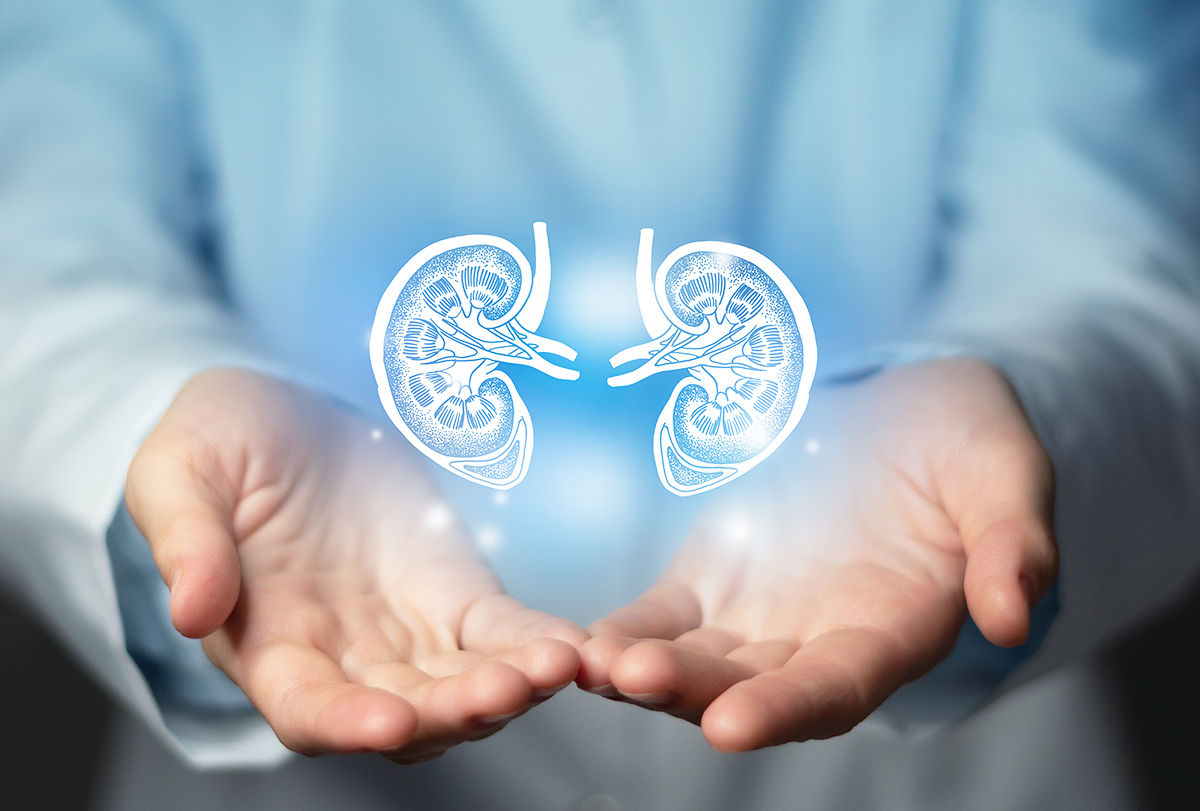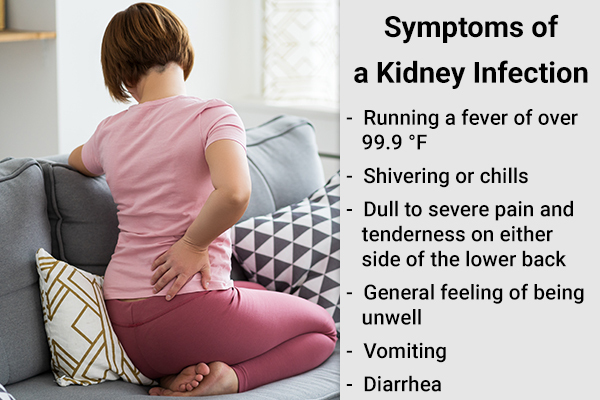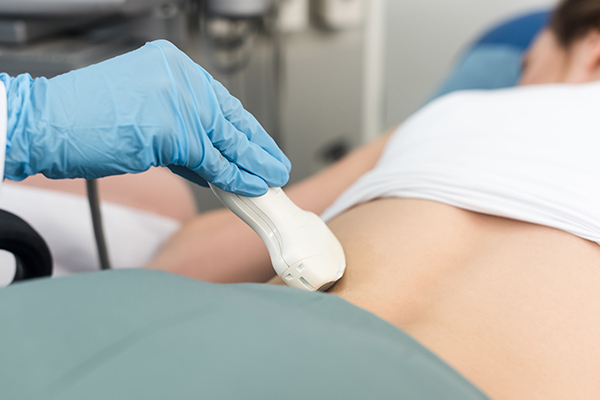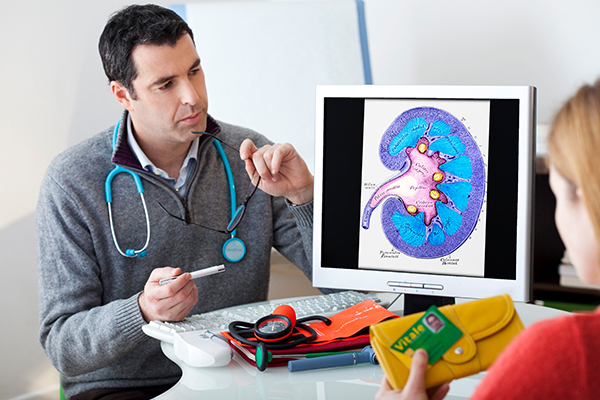In this article:
When a urinary infection is restricted to the bladder, the condition is referred to as cystitis. (1) This is a relatively common urinary tract infection and is not associated with any serious damage apart from making urination quite painful and discomforting.

However, if not treated properly, cystitis can progress into a more serious condition as the bacteria multiply and migrate further to infect one or both the kidneys.
If caught early, this type of kidney infection is relatively easy to cure but delayed or negligent treatment can cause the bacteria to spread to your bloodstream and cause life-threatening complications and increase the risk of permanent kidney damage.
Some kidney infections can develop without a bladder infection and are due to a problem within the kidney itself. As an example, people with kidney stones or a renal abnormality are more susceptible to kidney infections.
Types of Kidney Infection
Kidney infections are broadly categorized into the following types:
1. Acute kidney infection
Acute kidney infection refers to a relatively non-threatening form of pyelonephritis wherein the problem resolves completely when adequately treated. (2)
However, the condition is said to be chronic if the disease-causing bacteria continue to persist despite the prescribed treatment. As a result, the infection keeps recurring. This kind of sustained damage can severely compromise your kidney function. (2)
2. Chronic pyelonephritis
Chronic pyelonephritis can even lead to the release of bacteria into the bloodstream, paving the way for subsequent infections in the opposite kidney or elsewhere in the body. (2)
This long-standing condition is usually rooted in certain underlying abnormalities, such as a structural blockage in the urinary tract, large kidney stones that persist, and vesicoureteral reflux, a condition that causes small amounts of urine to flow backward from the bladder into the kidneys or cysts in the kidney.
Although chronic pyelonephritis is comparatively uncommon, most cases are reported in children and people with urinary blockages.
Causes of a Kidney Infection
Kidney infections can be the result of any of the following:
- Bacteria that usually reside in the gut area have easy access into the urinary tract through the anus or vagina. Once these pathogens enter the urethra, they proliferate and spread, eventually gaining entry into the kidneys through the ureters. The most common culprit is Escherichia coli, which is responsible for about 90 percent of cases of pyelonephritis among people who are not hospitalized or living in a nursing home.
- Any physical obstruction to the flow of urine on account of structural deformities, kidney stones, or benign prostatic hyperplasia (enlarged prostate gland). Another common precipitating factor for pyelonephritis is a condition called vesicoureteral reflux, which causes the backflow of urine from the bladder into the ureters and thereby to the kidneys.
- About 5 percent of pyelonephritis cases can be traced back to infections that are carried through the bloodstream to the kidneys from another part of the body. For instance, a staphylococcal skin infection can breach the skin to make its way to your blood and eventually spread to the kidneys through the bloodstream.
- Even more rarely, you might contract a kidney infection in the aftermath of a kidney surgery.
Symptoms of a Kidney Infection

It takes between a few hours to a day for the symptoms of acute pyelonephritis to manifest. Some of the most commonly reported indicators of a probable kidney infection include: (3)
- Running a fever of over 99.9 F
- Shivering or chills
- Dull to severe pain and tenderness on either side of the lower back
- General feeling of being unwell
- Vomiting
- Diarrhea
Children with acute pyelonephritis may also exhibit additional symptoms, such as:
- Low levels of energy resulting in constant lethargy
- Irritability
- Poor appetite and/or vomiting
- Abdominal pain
- Jaundiced appearance characterized by yellowing of the skin and the whites of the eyes
- Blood in the urine
- Foul-smelling urine
- Tendency to wet the bed
Around one in three people with acute pyelonephritis will also have symptoms of a lower urinary tract infection (cystitis). These can include:
- Dysuria or a stinging or burning sensation when urinating
- Increasingly persistent and frequent need to urinate
- Pressing urge to urinate even if you pass very little or no urine
- Passing urine that is cloudy or dark colored
- Passing urine that may have a strong, unpleasant smell
- Blood or pus in your urine
Children with long-standing pyelonephritis can exhibit signs and symptoms of poor growth and failure to thrive.
Treatment for Pyelonephritis
The first line of treatment for pyelonephritis involves a doctor-prescribed course of antibiotics to eliminate the bacteria. The choice of drug will depend upon the bacteria detected on the urine tests. (4)
If the infecting pathogen remains unidentified, your doctor will recommend a broad-spectrum antibiotic that will treat the most commonly seen bacteria in this condition. The severity of your symptoms helps decide the choice of antibiotic and duration of the treatment.
Although your condition will show signs of improvement within a few days of taking the antibiotic, it is imperative that you complete the full course of antibiotics prescribed by your doctor to ensure that the infection is completely eradicated.
On occasion, the doctor may change your medication after 2 days, particularly in the event that:
- Your symptoms are not getting better.
- The urine test results indicate the need for a different antibiotic.
Oral drugs sometimes prove ineffective and insufficient for treating severe kidney infections. People who exhibit particularly severe symptoms, such as considerable nausea and vomiting, persistently high fever, signs of dehydration, and debilitating pain, may need to be hospitalized for a few days.
Treatment in the hospital may include intravenous administration of antibiotics and fluids as well as regular sampling of your blood and urine to track the improvement of the infection.
Your stay at the hospital usually depends upon how well you respond to the treatment, and once you are released, the doctor will give you 10 to 14 days’ worth of oral antibiotics to take home.
Diagnosing a Kidney Infection

Given that the symptoms of a kidney infection can apply to certain other problems in the pelvis and abdomen, your doctor will have to conduct a thorough evaluation to reach a conclusive diagnosis.
To that end, your health care provider may use the following tests:
- He/she will take a comprehensive overview of your medical history and inquire about your symptoms.
- This will be followed by a general physical exam, wherein your doctor will examine your abdomen to check for pain or tenderness. Appropriate urine and blood tests will be done to evaluate for infection.
- The doctor will order a urinalysis to check your urine for possible traces of bacterial infection. A urine culture will help the doctor determine the best antibiotic to use for eradicating the growth of bacteria.
- A blood culture will help rule out the potential spread of infection to your bloodstream.
- Although a CT scan does not figure as a standard test to diagnose kidney infections, it can help delineate possible blockages in the urinary tract that might be at the root of the problem.
- Similarly, an ultrasound can guide treatment strategies by displaying probable obstructions in the form of stones or other things that block the urinary tract.
- A voiding cystourethrogram (VCUG) is an X-ray image of the bladder and urethra taken while the bladder is full and during urination. It uses a contrast dye. This test can show problems in the urethra and bladder.
- Men may be advised to go through a more comprehensive digital rectal examination (DRE) to look for signs of an enlarged prostate that may be blocking the neck of the bladder.
- Dimercaptosuccinic acid (DMSA) scintigraphy is another imaging tool that is used to determine signs of kidney infection, scarring, and damage. The procedure entails the injection of a radioactive material through a vein in the arm which travels to the kidneys. Specially designed cameras and computers are used to generate images, tracking the movement of this material as it passes through the kidneys to see if they are working properly.
Your doctor will also look for problems that can cause a kidney infection, such as kidney stones and birth defects. Your treatment will be based on a clear diagnosis of the problem.
What Does Chronic Pyelonephritis Entail?
As far as chronic pyelonephritis is concerned, the outlook of this condition tends to vary from patient to patient. For the majority of patients, the condition is characterized by occasional bouts of kidney infection without any major discomfort or pain.
Others require regular monitoring by a kidney specialist. In some patients, the infection causes significant damage to the kidneys, resulting in significant impairment of kidney function leading to kidney failure. In such extreme cases, the patient may require long-term dialysis or a kidney transplant.
Risk Factors of a Kidney Infection
Some people run a higher risk of developing kidney infections than others due to the following factors:
- People who suffer from a bladder infection are naturally susceptible to a potential escalation of their condition to the kidneys.
- Kidney infections tend to be more prevalent among women than men due to the shorter length of their urethras. Many a time, bacteria can spread from the vaginal or anal openings to the urethra and then advance upwards in the urinary tract. Because the urethra is more closely located to the vagina and anus in women than it is in men, women show a greater likelihood of picking up such infections.
- People with structural defects in their urinary tract may find it harder to pass urine and are therefore at an increased risk for infection.
- People whose urinary tract is obstructed by the presence of uterine fibroids, benign prostatic hyperplasia, and kidney stones also belong to the high-risk category.
- Pregnant women are also increasingly vulnerable to this infection as their burgeoning uterus can end up squeezing the ureters. As a result, the flow of urine is restricted, increasing the tendency to develop bacterial infections.
- People with weakened immunity due to diseases such as diabetes or HIV or on account of certain drugs such as immunosuppressants have a greater predisposition for this disease.
- Some people fail to pick up on the symptoms of an ongoing bladder infection due to preexisting nerve or spinal cord damage that renders them unable to feel the pain associated with this condition. A bladder infection that is not treated in a timely and proper fashion can lead to a subsequent kidney infection.
- The bacteria can easily find their way into the urinary tract through a catheter that is used to drain urine from the bladder.
- People who suffer from vesicoureteral reflux (VUR), a condition characterized by the backward flow of urine from the bladder towards the kidneys, are also susceptible.
- People who have structural kidney problems such as polycystic kidney or kidney stones are at high risk of kidney infection.
Complications Associated With a Kidney Infection

Negligent or delayed treatment of acute pyelonephritis can give rise to potentially serious complications:
- There can be irreversible damage to the kidney tissue leading to chronic kidney disease or, rarely, kidney failure.
- Pregnant women with infected kidneys have a higher likelihood of delivering low-birthweight babies.
- Your kidneys are responsible for filtering waste from your blood and then returning the purified blood to the rest of your body. However, if bacteria start to breed within the kidneys, there is a chance that the infection could spill over into the bloodstream and spread to other parts of your body. This life-threatening condition is referred to as sepsis.
- Severe kidney infection can lead to acute kidney failure.
- Very rarely, there may be a buildup of pus within the infected kidney, resulting in the development of a kidney abscess. This may require a surgical procedure to drain the pus from the kidneys.
- Your kidneys may be vulnerable to renal scarring, which is often accompanied by chronic kidney disease.
When to See a Doctor
Kidney infections can take a turn for the worst if left untreated and lead to complications that can jeopardize your health to the extent of being fatal. Thus, it is paramount that you consult with your healthcare provider the minute you notice possible signs of pyelonephritis.
The onset of certain symptoms particularly warrants the need for prompt medical assistance, which include:
- If you run a high temperature
- If you experience persistent pain in the abdomen, middle and lower back, or genitals
- If you notice blood in your urine
- If you are grappling with constant nausea and frequent vomiting
- If you are already undergoing treatment for a UTI but the symptoms haven’t improved after a few days
Professional medical help is especially indispensable in the case of children who may have a kidney infection.
What Should You Expect From the Doctor?
The usual line of questioning that a doctor follows to evaluate your condition touches upon the following:
- When did you first notice your symptoms?
- Are your symptoms consistent or sporadic?
- How would you rate your symptoms in terms of severity?
- Are there any mitigating factors that seem to make your symptoms better or less intense?
- Are there any aggravating factors that tend to worsen your symptoms?
Expert Answers (Q&A)
Answered by Dr. Seyedmahdi Pahlavani, M.D. (Nephrologist)
The severity of pyelonephritis depends on many factors such as the type of pathogen, patient’s age, gender, immune status, and other co-morbidities. It may result in bloodstream infection (known as sepsis) if left untreated, which has a very high mortality rate.
Treatment of pyelonephritis could be complicated in elderly individuals, pregnant patients, patients with immunosuppression, patients with a current kidney stone, and patients with a recent history of hospitalization and antibiotic treatment and it could be fatal in these groups of patients.
Prompt treatment by seeking medical attention is the first step to protect your kidneys from potential complications from pyelonephritis. Once the diagnosis is confirmed, follow the instructions provided by your healthcare provider and ensure you have completed the antibiotic course.
Sometimes, you need to confirm the infection’s eradication by a urine test after the treatment has completed.
Sexually transmitted disease may increase the chance of urinary tract infection but it is very unusual that a kidney is infected because of sexual activity.
Kidney infection is a serious condition and may lead to blood-stream infection (known as sepsis), local expansion of infection (abscess formation), and kidney failure if left untreated. The appropriate antibiotic regimen should be chosen based on patient’s condition and underlying etiologic pathogen for prompt treatment of kidney infection (pyelonephritis) to avoid complications.
Pyelonephritis may cause scars in kidney parenchyma and recurrent infections will increase the chance of chronic kidney disease (CKD) and eventually end-stage renal disease (ESRD) in long term. However, severe pyelonephritis may cause acute kidney failure.
On the other hand, a complicated form of pyelonephritis that is called xanthogranulomatous pyelonephritis requires nephrectomy (surgical removal of affected kidney).
Final Word
It is important to have regular visits to your healthcare provider to diagnose kidney dysfunction at early stages especially if you have a risk factor for kidney diseases like diabetes, hypertension, and chronic recurrent infections.
Controlling blood pressure and maintaining good diabetes control are the major conditions to decrease the rate of declining kidney function and its rate of progression.
A healthy diet and regular exercise may play an important role in maintaining good blood pressure and glucose control and will eventually result in maintaining good kidney function.

- Was this article helpful?
- YES, THANKS!NOT REALLY


